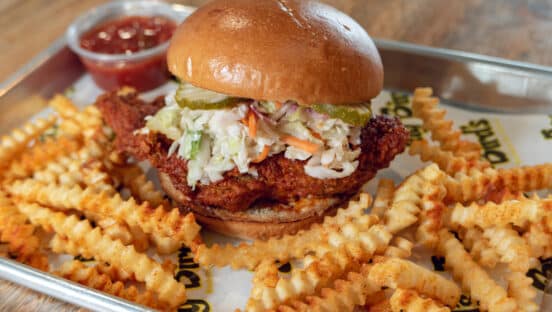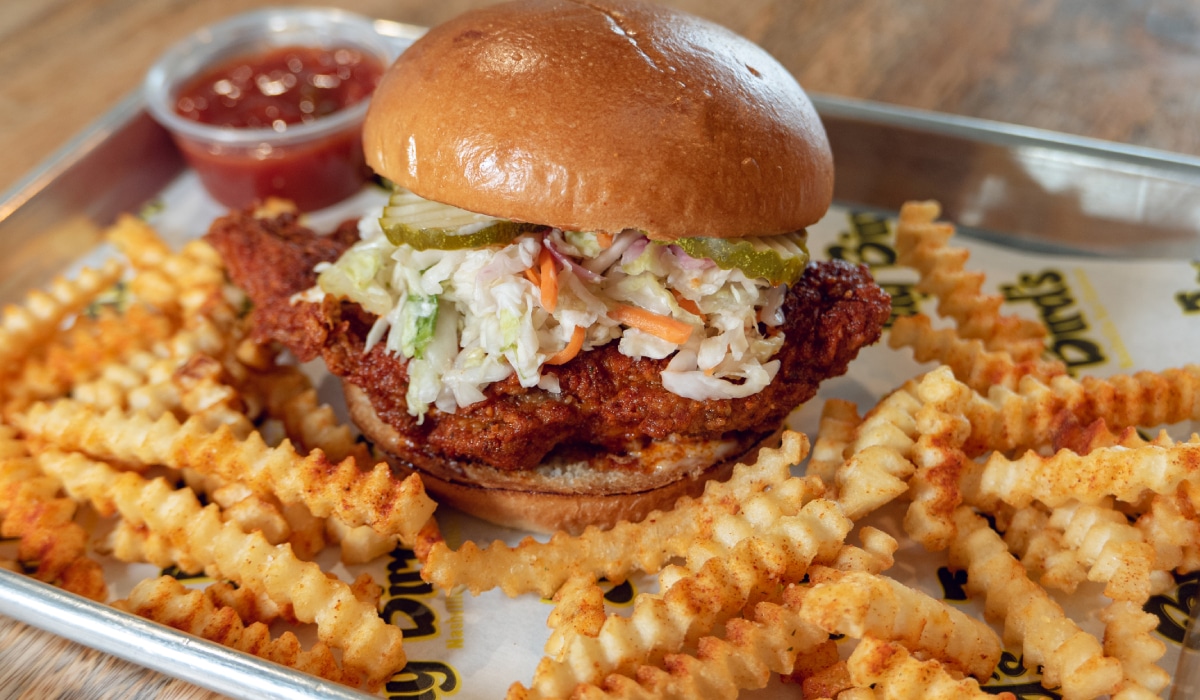Surrounded by steep canyon walls and pine forests, Stagecoach Roadhouse in Sedona, Arizona, offers smoked meats and creative appetizers in a playful atmosphere with live country music and mechanical bull riding. Nestled at the Arabella Hotel just five minutes down the road, Molé Comida showcases upscale Mexican cuisine that blends traditional recipes with a contemporary twist. A few blocks away, Jay Bird’s serves up Nashville hot chicken with six different levels of heat in a quick-service environment. Those are a few of the concepts Wild Thyme Restaurant Group has brought to its hometown.
Having such a diverse portfolio of cuisines and service models comes with advantages and challenges, says CEO Niko Viramo. The former hotel and cruise line executive took the helm last year to help steer the company into its next chapter.
Founders: Heinrich Stasiuk
Headquarters: Orange, California
Year Started: 2009
Annual Sales: ~$47 million
Total Units: 15
- Shorebird: 3
- Molé Comida: 2
- Stagecoach: 3
- Kai/Kaiseki: 2
- Jay Bird’s: 5
Franchised Units: 1
“All of these concepts are already successful and are already in the process of growing,” he says. “Now, it’s just about taking them to the next level and thinking about which concepts we’re really going to scale. We’re still quite small in terms of the number of hands on the corporate team, so we can’t focus on expanding all of the concepts at the same time. That means we have to pick and choose where we want to go next.”
Founded in 2009 by hospitality veteran Heinrich Stasiuk, Wild Thyme has rapidly grown its footprint across Sedona and the Western U.S. with a series of new ventures in recent years. Jay Bird’s has spread its wings with five locations in Arizona, California, and Utah since taking flight five years ago. Stagecoach Roadhouse got its start in 2022 and has two other stores in California. Molé Comida launched that same year and has one additional unit in the Sunshine State.
There’s also Shorebird, which launched in 2020 and has a store in Sedona along with two haunts in California. It offers an expansive menu of upscale, globally inspired dishes in a casual-dining atmosphere. Think Kurobuta Sticky Ribs, Carne Adovada Tacos, and Chilean Sea Bass, plus bespoke cocktails, distinctive wines, and a roster of rotating beers on tap. Other restaurants in Wild Thyme’s sprawling portfolio include the single-unit concepts Kaiseki Sushi, which debuted last year in Utah, and Kai Japanese Bistro, which opened its doors in 2022 in California. The company also has a handful of F&B operations in hotels and resorts that specialize in everything from barbecue and burgers to craft cocktails.
After launching six new brands and more than a dozen locations in just a few short years, Stasiuk reached out to Viramo, a longtime friend from their days at Modul University in Vienna, Austria, to help accelerate growth and shape the company’s future trajectory. He brought over 25 years of experience in the hospitality industry to the fast-growing restaurant group.
“With my background from the hotel business and cruise lines, I know what it means to standardize products and services,” Viramo says. “Consistency is always the key, so I think one of the most important factors when you have so many brands is creating cohesive and detailed standard operating procedures across the board, and then elevating things even further by creating brand standards on top of that.”
He’s also been working to digitize the entire company, from HR and inventory to kitchen management and POS systems. Those tools are streamlining operations, giving leaders a more granular view of the business, and enabling data-driven decision-making throughout the organization.
One particularly useful investment is Birdeye, an AI-based tool that helps Wild Thyme manage its reputation, quickly respond to complaints, and track consumer feedback. It centralizes reviews of all of its locations that are posted across the internet in a single location.
“I think it’s very important for companies to be totally on top of what the guests are saying,” Viramo says. “People are leaving reviews all over the place, and that’s even more complicated when you need to collect feedback for multiple different restaurants.”
Wild Thyme has zeroed in on Shorebird and Molé Comida as key growth drivers. Viramo’s goal is to add around 10 units for both brands in the next three to five years, which would push the restaurant group past 30 locations companywide. There’s plenty of runway for Stagecoach Roadhouse, too. And he isn’t necessarily writing off the possibility of opening more sushi bars and Japanese restaurants, if the right product-market fit presents itself. That’s the benefit of managing multiple brands concurrently.
“One of the advantages of having many different concepts is that we could get a location opportunity that wouldn’t work for Shorebird, but perhaps we can still go in with Stagecoach or a different brand that’s a better fit,” Viramo says.
The company won’t be adding any more quick-service brands into the mix. It won’t be opening any more corporate-owned Jay Bird’s locations, either. It notched its first franchised location in California last year and plans to grow the brand through that model from here on out.
Viramo is more concerned with finding the right locations and the right operators than meeting a predetermined growth target, but he expects franchising activity will ramp up in the year ahead, thanks to strong customer demand at existing stores and the recent addition of a dedicated franchise development leader.
A laser-like focus on the flagship spicy chicken product—something that stems from the group’s expertise in delivering high-end full-service experiences—already is helping Jay Bird’s stand out in the saturated quick-service chicken segment, adds Jay Boginske, Wild Thyme’s director of culinary development.
“Obviously in the last five years, there’s been a lot of people trying to cash in on Nashville hot chicken, but I’d say nine out of 10 people that are serving it right now don’t understand the layers of seasoning and the layers of technique. We worked on it for an entire year, trying different brining techniques and getting the seasoning just right with ingredients I guarantee no one else is using, in order to build something really special,” Boginske says. “We knew we could do it better and outperform what was already out there because of our experience cooking and toying with recipes for different types of restaurants.”









